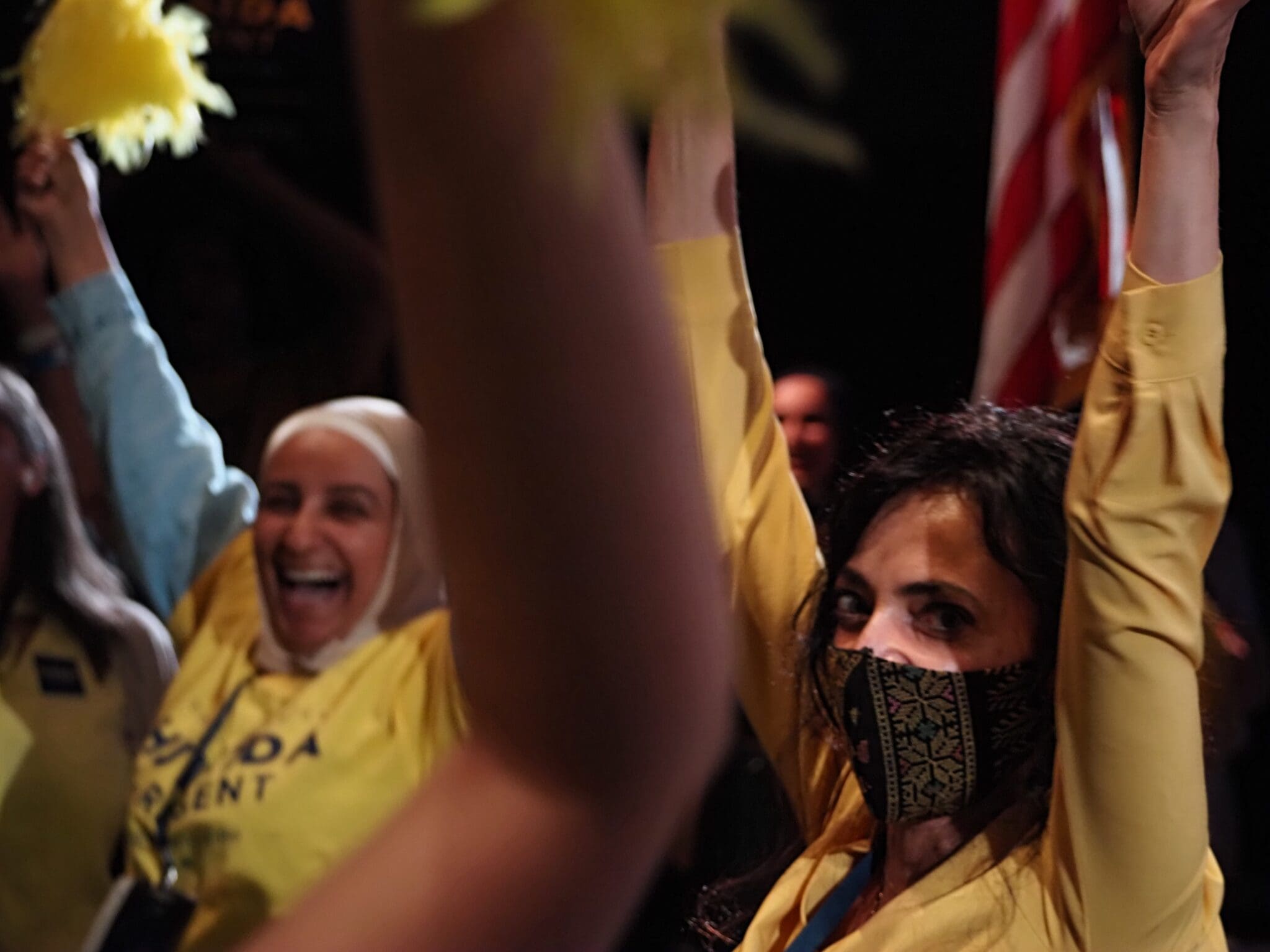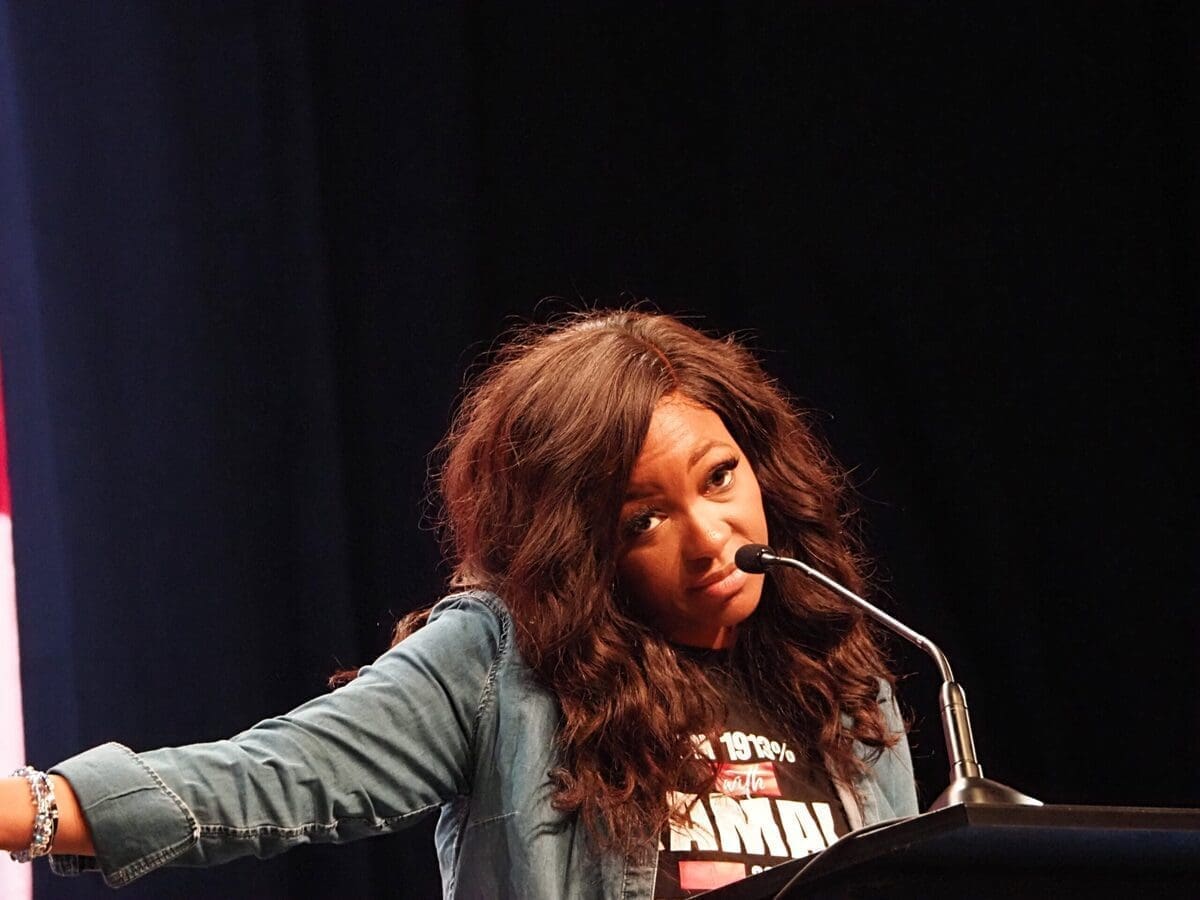
As Michigan Democrats on Saturday nominated their picks for Supreme Court and education boards on the Nov. 5 ballot, the University of Michigan Regents — the one contested race — took centerstage.
The nominating convention, held in Lansing, was flooded with supporters decked in maize shirts for Board of Regents candidate and pro-Palestinian movement leader Huwaida Arraf. Since the Israel-Hamas war began in October, the University of Michigan has had a number of pro-Palestinian demonstrations and an encampment, which university officials disbanded, with protesters calling on regents to divest from companies tied to Israel.
Arraf faced two other Democrats: current Regent Denise Ilitch, who was first elected to the board in 2008, and Dr. Shauna Ryder Diggs, who had previously served as a regent until 2020. They were endorsed by both Gov. Gretchen Whitmer and a coalition of labor unions.
But after a lengthy voting process, Arraf did not win either of the slots, sparking calls from her backers to break with the Democratic Party.
“In November, we’ll remember,” chanted Arraf’s supporters, echoing a call from the “uncommitted” movement that opposed President Joe Biden’s renomination over his handling of the Israel-Hamas war. Biden has since stepped aside and Democrats last week nominated Vice President Kamala Harris at their convention in Chicago.
They also chanted, “Show the math,” in protest of the MDP’s proportional representation voting rules they claim cost Arraf the nomination.

“They always take us for granted,” Arraf told the Michigan Advance ahead of the vote being announced on Saturday. “While [former President Donald] Trump was bad, this is actually a genocide that’s happening on a Democratic watch. So there’s so many people that we believe are needed to win in November, we need to bring them back. And so just uncommitted wants to say to the party, ‘We need you to show us and show our community that you are going to change policy.’ Let’s see an arms embargo [of Israel].”
Arraf has posted to social media frequently about the war in Gaza, which has resulted in more than 40,000 deaths, including denials about widespread sexual assault that occurred during the Oct. 7 attack by Hamas militants, support for the attack itself, which killed an estimated 1,200 Israelis and resulted in 240 hostages being taken.
Throughout the Democratic National Convention (DNC), members of the uncommitted movement pleaded with the event’s organizers to have a Palestinian-American speaker take the stage. The effort was not successful.
One of the overarching themes of the DNC was unity. But as an alternate uncommitted delegate for Michigan, who was at the convention in Chicago, Arraf said that the convention communicated a different message to Palestinian-Americans: “We don’t want to hear you.”
“It sends the wrong messages. ‘We don’t care about what you have to say. We’re going to come to you. We want your votes in November, but we don’t want your voice,” Arraf said.
At the DNC, several Democrats, including Harris, U.S. Rep. Alexandria Ocasio-Cortez (D-N.Y.) and U.S. Sen. Bernie Sanders (I-Vt.), all called for a ceasefire and the return of hostages.
Earlier on Saturday, Michigan House Speaker Joe Tate (D-Detroit) and other candidates and elected officials came to the Arab-American Democratic caucus meeting to express their appreciation for the community.
Tate was adamant that all Democrat voices ought to be heard, saying of the national convention snub to have a Palestinian speaker, “… You look in 1964 during the Civil Rights Movement, the Black community, they were saying the same thing. … So having those voices in the room, that’s what makes us. That’s what gives us our strength. That’s what gives us our strength.”
Tate’s No. 2, House Majority Floor Leader Abraham Aiyash (D-Hamtramck), helped lead the uncommitted fight this spring and is the highest-ranking Muslim American in the state’s legislative history.
U of M Regent Jordan Acker was confronted by some Arraf supporters before and during the national anthem at the MDP convention. Acker, a Democrat, said he voted for Diggs and Ilitch.
“I think there are a lot of people in this movement who care deeply about Palestinian rights. I believe there are a lot who are sick of the bloodshed and sick of the occupation, which is brutal and indefensible, especially in the West Bank,” Acker wrote in a social media thread. “But this movement is entirely stained by actors within who see their main mission as eliminating public Jews from public life.”
Some pro-Palestinian protesters have targeted the homes of U of M regents, including Acker and Chair Sarah Hubbard, a Republican. In May, they used a bullhorn to chant, “Regent Hubbard, you can’t hide; you are funding genocide,” while placing what officials described as “fake corpses wrapped in bloodied sheets,” as well as stuffed animals covered in red paint, on the porch and front lawn.
Acker’s Southfield law office, Goodman Acker P.C., was covered in June with graffiti, including phrases such as, “Free Palestine,” “Divest now” and “F–k you Acker,” were spray-painted on the building and sidewalk in front.
“I was not targeted here today because I am a regent,” said Acker at the time. “I am a target of this because I am Jewish. This neighborhood is Jewish, and because some people, under the pretext of helping Palestinians, feel the obligation to single out Jews, especially liberal ones for an attack.”
Acker was also followed around by pro-Palestinian protesters at Harris’ Detroit campaign event last month.
“Let me be clear to those who continue to harass me: you will not remove this public Jew from public life,” Acker wrote on Saturday. “… You can vandalize my office, you can come to my house in the middle of the night, you can harass me in public, but I have news for you. YOU. WILL. LOSE. This public Jew is going nowhere. Deal with it.”
Other nominations and speeches
Republicans also held their nominating convention on Saturday, with theirs taking place in Flint. In addition to the U of M Board of Regents, both parties chose nominees for: Michigan Supreme Court, the Michigan State University Board of Trustees, the Wayne State Board of Governors and the State Board of Education. All offices will appear on the statewide ballot in November.
Electing board members for three public universities statewide ets Michigan as an outlier, with other states doing so via gubernatorial or legislative appointment or different elected processes.
All the other races for the Democratic slots were uncontested. All of the winners were endorsed by Whitmer and the union coalition.
The Democratic candidates for the two seats up for grabs on MSU’s board are former Ingham County Commissioner Rebecca Bahar-Cook and former Michigan Rep. Thomas Stallworth III.
The picks for the two available seats on the Wayne State University Board of Governors are current member and former Michigan AFL-CIO President Mark Gaffney and Rasha Demashkie, a former member of the Michigan Civil Rights Commission and other boards.
Former state Rep. Adam Zemke and Theodore Jones, a Detroit Public Schools administrator, are Democrats’ picks to be on the State Board of Education.
Jones made commitments to individuals in the room that if elected, he would seek out funding for schools and help students recover from learning loss caused by disruptions from the pandemic. He also committed to working to get a constitutional amendment on the ballot saying that “each and every student in Michigan deserves a high-quality education.”
Zemke said he’s on a mission to “save public education from extremists.
“Extremists are targeting our kids and our teachers with hateful rhetoric, with white-washing and rewriting of history and even guns,” Zemke said. “It is sad and scary. … We must save public education and then we must work and have the debates about how we improve it because saving it from extremists is simply insufficient.”
Currently, Democrats hold a 4-3 majority on the Michigan Supreme Court. Two seats will be up for election in November. If the GOP wins both, that would result in a 4-3 partisan flip or Democrats could achieve a 5-2 supermajority if both their candidates win.
Republican-nominated Justice David Viviano announced his retirement in March, leaving one seat open. Justice Kyra Harris Bolden, who was appointed to the seat by Whitmer after Justice Bridget Mary McCormack retired in 2022, is also up for reelection for a full eight-year term.
Michigan Democrats chose Bolden and U of M professor and trial lawyer Kimberly Thomas as their nominees.
Thomas reminded convention attendees that lots of people think they’ve cast their vote for Michigan Supreme Court, but ultimately aren’t counted. Although parties nominate candidates for the high court in Michigan, those seats appear on the nonpartisan portion of the ballot — so if voters choose the straight-ticket option, they’re still leaving the state Supreme Court section blank.
“I hear a lot of comments about our federal Supreme Court. You here in Michigan, we all have an opportunity to have your voice heard about what kind of justices you want on your state Supreme Court, what kind of values you want them to embody and who you want to represent you. … So please have your voice heard,” Thomas said.
Joined by her grandmother and mother at the convention, Bolden said the possibility of a 5-2 Democratic majority presents an opportunity to provide “justice for generations,” reminding the crowd that she previously received the party’s nomination for the court six days after giving birth to her daughter in 2022. While she lost that election, Whitmer appointed her to the court the next month.
Out of all the work the Supreme Court has done in the year-and-a-half she has served on it, Bolden told the Arab-American Democratic caucus earlier in the day that there have been 30 majority opinions issued by justices that will impact Michiganders for years to come.
“The decisions that we make set a precedent. So that means, unless a different court comes along and disagrees, those decisions stay in place. We’re not making decisions just for the people living here [for] my grandmother, who’s running around taking signatures, my mother, who’s taking signatures, or my daughter that is 2-years-old — but for her children and for her children’s children.”

The convention also featured speeches from other Democratic leaders.
Democracy in America is under attack, Secretary of State Jocelyn Benson told attendees at the state convention, and Michigan is in the thick of the battle. With lies and misinformation swirling around this election season, Benson said the only way Michiganders will lose their voice this election season is if those spreading deceit convince them they have no power.
“We are not going to let them make us feel that way. Are we Michigan?” Benson said. “We are not going to allow any of the noise to confuse us about the power we all have in this moment. That power, the power of Michigan citizens in this election is the power to decide the future of our nation.”
Benson, who’s expressed interest in running for governor when Gov. Gretchen Whitmer terms out in 2026, added that this election and the weeks leading up to November will determine the future of Michigan’s children and generations to come.
“The eyes of the nation and the world will be on Michigan this fall,” Benson said. “The eyes of brave souls throughout history who fought and bled so that we could live in a land where all are free and equal, their eyes are on us now. The eyes of the future of this country, the kids who are here today, the young boys and girls who will inherit what we leave behind, their eyes are on us now. It’s on us now to show who we are, what we stand for and what we will fight for.”
Michigan is the “prototype” for Democratic progress, Texas U.S. Rep. Jasmine Crockett said, noting the state has a Democratic governor, secretary of state and attorney general, Dana Nessel. While Michigan residents have a state constitutional right to an abortion, Texas Republicans who control the state are considering the death penalty for residents who get abortions.
Michigan holds sway this election, with Harris and former President Donald Trump vying for the state’s 15 electoral votes.
“I need y’all. … We are relying on you in Michigan. We need you because united we stand, divided we fall and we are all in this fight together to make sure Kamala Harris and [Minnesota Gov.] Tim Walz become the president and vice president of the United States.” Crockett said. “Texas used to be blue … do not take it for granted. Don’t take this election for granted. We all need Michigan to be blue in November.”
GET THE MORNING HEADLINES DELIVERED TO YOUR INBOX
This article was originally published on Michigan Advance and republished here, with permission, under a Creative Commons License.








